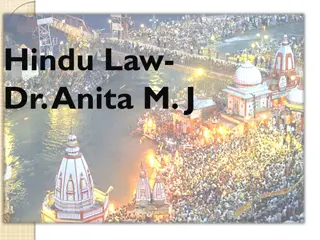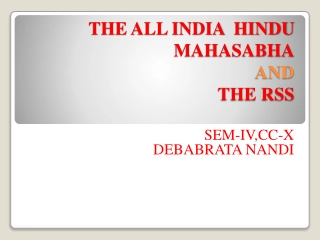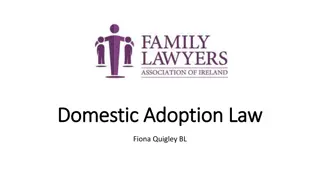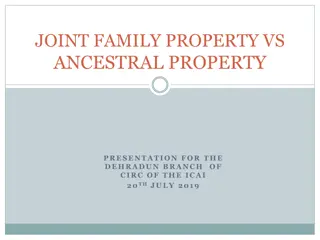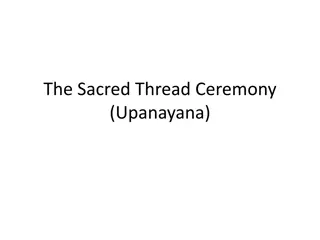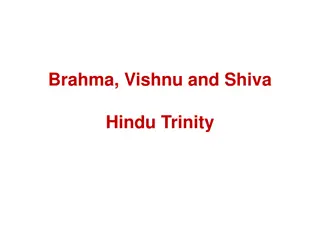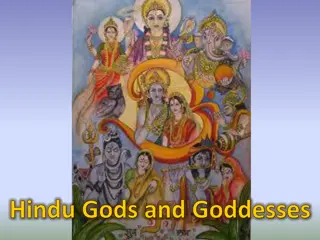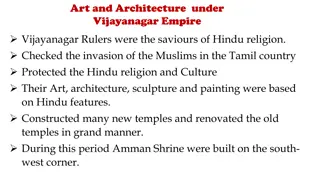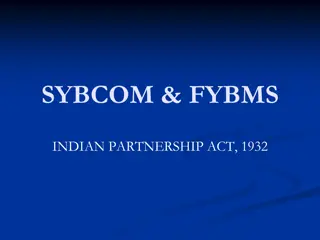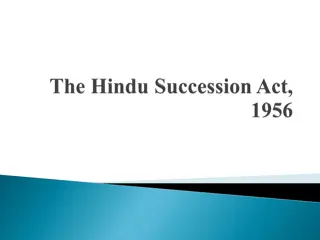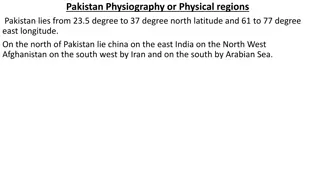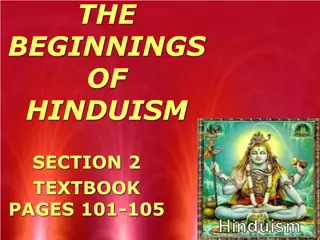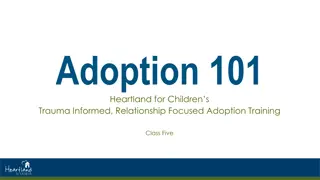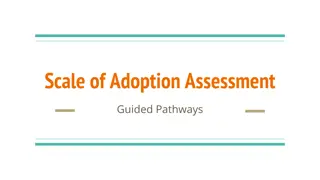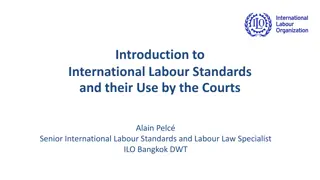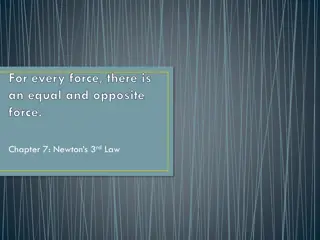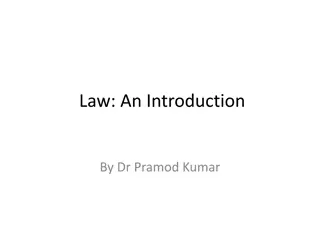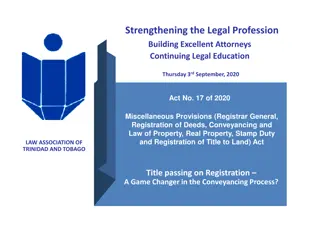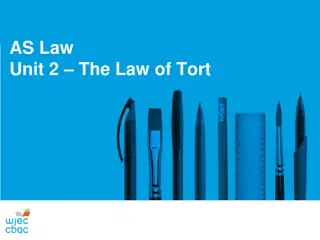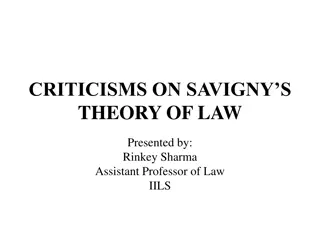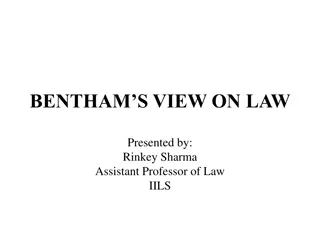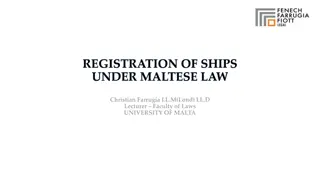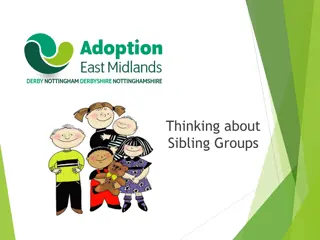Understanding Adoption under Hindu Law
Adoption under Hindu Law holds significant importance, with various types of sons recognized historically. Modern Hindu law focuses on legitimate adoption, defining adoption as the transplantation of a son to another family with legal rights and duties. The Hindu Adoption and Maintenance Act, 1956, codifies the adoption process, ensuring compliance with specific requisites for a valid adoption.
Download Presentation

Please find below an Image/Link to download the presentation.
The content on the website is provided AS IS for your information and personal use only. It may not be sold, licensed, or shared on other websites without obtaining consent from the author. Download presentation by click this link. If you encounter any issues during the download, it is possible that the publisher has removed the file from their server.
E N D
Presentation Transcript
Adoption Under Hindu Law COMPILED BY RAHUL PANDEY ASST. PROFESSOR SHIA P.G. COLLEGE, LUCKNOW
SONSHIP & ADOPTION The son under the Hindu Law has been assigned utmost importance in the Hindu Dharamshastras, male issue was treated as necessary for protecting the deceased parents from the suffering of the hell and to perform their funeral obligations. The ancient Hindu Law mentioned about the following kinds of son i.e. Aurasa - The legitimate son. Dattaka - The adopted son. Kritima - The son made. Kshetraja - The son begotten from another man with the consent of the husband. Gudhhaja - son secretly brought forth by the wife. A son born in the family but as to who begot him being unknown Kanina - son secretly born to an unmarried damsel. o o o o o o
Continued Putrika Putra - son of an adopted daughter. Sahodhhaja - son born to the wife who was pregnant at the time of the marriage. Krita - son purchased from his parents on some price, is the Krita son of the purchaser. Swayamdatta - where an abandoned son offers himself to one. Punarbhava - son of a remarried woman. The son born to a women deserted by her husband or a remarried widow, of her own desire, is known as the paunarbhava son of the begetter. Apviddha - where an abandoned son was accepted by a person on his own initiative. Nishad - son of a Brahmin by his Shudra wife.
Continued But , in modern time ,our present Hindu law enactments are concerned with only two kinds of sons , namely- Legitimate Adoption
ADOPTION Meaning: According to Manu, Adoption is the taking of a son , as a substitute for the failure of a male issue . Thus it is a Transplantation of a son from one family in which he is born to another family where he is given by the natural parents by way of gift . Adoption is a legally recognised mode of a affiliation as the son of person , of one who in fact was not his son. On adoption, ties of the son with his old family are severed and he is taking being born in the new family, acquiring rights, duties and status in the new family. Therefore , no adoption is considered valid unless it fulfils the above mentioned conditions under section 6 of the Hindu adoption and maintenance act 1956. Now, in the present scenario, the Hindu adoption and maintenance act, 1956 has completely codified the law of adoption and has materially modified it in correspondence to the need of dynamism of Hindu society. Therefore, every adoption shall be made in conformity with this act and any contravention of the provisions of this act shall be void.
REQUISITES OF A VALID ADOPTION (SECTION-6) No adoption shall be valid unless- The person adopting has the capacity, and also the right, to take in adoption; Section 7,8 i. The person giving in adoption has the capacity to do so; Section 9 ii. The person adopted is capable of being taken in adoption ; Section 10 iii. The adoption is made in compliance with the other conditions mentioned in this chapter. Section 11 iv.
CAPACITY OF A MALE HINDU TO TAKE IN ADOPTION(SECTION-7) Any male Hindu who is of sound mind and is not a minor has the capacity to take a son or a daughter in adoption. Provided that, if he has a wife living, he shall not adopt except with the consent of his wife unless the wife has completely and finally renounced the world or has ceased to be a Hindu or has been declared by a court of competent jurisdiction to be of unsound mind Explanation- If a person has more than one wife living at the time of adoption, the consent of all the wives is necessary unless the consent of any one of them is unnecessary for any of the reasons specified in the preceding proviso.
CAPACITY OF A FEMALE HINDU TO TAKE IN ADOPTION(SECTION-8) Any Female Hindu who is of sound mind and is not a minor has the capacity to take a son or daughter in adoption: Provided that, if she has a husband living, she shall not adopt a son or daughter except with the consent of her husband unless the husband has completely and finally renounced the world or has ceased to be a Hindu or has been declared by a court of competent jurisdiction to be a unsound mind. Note: An unmarried woman and a women who has been divorced can take a child in adoption.
PERSONS CAPABLE OF GIVING IN ADOPTION(SECTION-9) No person except the father or mother or the guardian of a child shall have the capacity to give the child in adoption. Subject to the provisions of sub-section (4) , the father or the mother, if alive, shall have equal right to give a son or daughter in adoption: Provided that such right shall not be exercised by either of them save with the consent of the other unless one of them has completely and finally renounced the world or has ceased to be a Hindu or has been declared by a court of competent jurisdiction to be of unsound mind.
Continued Where both the father and mother are dead or have completely and finally renounced the world or have abandoned the child or have been declared by a court of competent jurisdiction to be of unsound mind or where the parentage of the child is not known, the guardian of the child may give the child in adoption with the previous permission of the court to any person including the guardian himself. Before granting permission to a guardian under sub section (4) the court shall be satisfied that the adoption will be for the welfare of the child, due consideration being for this purpose given to the wishes of the child having regard to the age and understanding of the child and that the applicant for permission has not received or agreed to receive and that no person has made or given or agreed to make or give to the applicant any payment or reward in consideration of the adoption except such as the court may sanction.
Continued Explanation- For the purposes of this section- i. The expressions father and mother do not include an adoptive father and an adoptive mother, (i-a) guardian means a person having the care of the person of a child or of both his person and property and includes- a) A guardian appointed by will of the child s father or mother ;and b) A guardian appointed or declared by a court ; and ii. court means the city or civil court or a district court within the local limits or whose jurisdiction the child to be adopted ordinarily resides.
PERSONS WHO MAY BE ADOPTED(SECTION- 10) No person shall be capable of being taken in adoption unless the following conditions are fulfilled, namely- He or she is Hindu ; i. He or she has not already been adopted ; ii. He or she has not married, unless there is a custom or usage applicable to the parties which permits person who are married being taken in adoption; iii. He or she has not completed the age of fifteen years; unless there is a custom or usage applicable to the parties which permits persons who have completed the age of fifteen years being taken in adoption. iv.
OTHER CONDITIONS FOR A VALID ADOPTION(SECTION-11) In every adoption, the following conditions must be complied with; If any adoption is of a son, the adoptive father or mother by whom the adoption is made must not have a Hindu son, son s son or son s son s son (whether by legitimate blood relationship or by adoption) living at the time of adoption; If the adoption is of a daughter the adoptive father or mother by whom the adoption is made must not have a Hindu daughter or son s daughter (whether by legitimate blood relationship or by adoption) living at the time of adoption; If the adoption is by a male and the person to be adopted is a female, the adoptive father is at least twenty-one years older than the person to be adopted; If the adoption is by female and the person to be adopted is male, the adoptive mother is at least twenty-one years older than the person to be adopted; i. ii. iii. iv.
Continued The same child may not be adopted simultaneously by two or more persons; The child to be adopted must be actually given and taken in adoption by the parents or guardian concerned or under their authority with intent to transfer the child from the family of its birth or in the case of an abandoned child or a child whose parentage is not known, from the place or family where it has been brought up to the family of its adoption
EFFECTS OF ADOPTION(SECTION-12) An adopted child shall be deemed to be the child of his or her adoptive father or mother for all purposes with effect from the date of the adoption and from such date all the ties of the child in the family of his or her birth shall be deemed to be severed and replaced by those created by the adoption in the adoptive family. Provided that- a) The child cannot marry any person whom he or she could not have married if he of she had continued in the family of his or her birth; b) Any property which vested in the adopted child before the adoption shall continue to vest in such person subject to the obligations, if any, attaching to the ownership of such property, including the obligation to maintain relatives in the family of his or her birth; c) The adopted child shall not divest any person of any estate which vested in him or her before the adoption.


